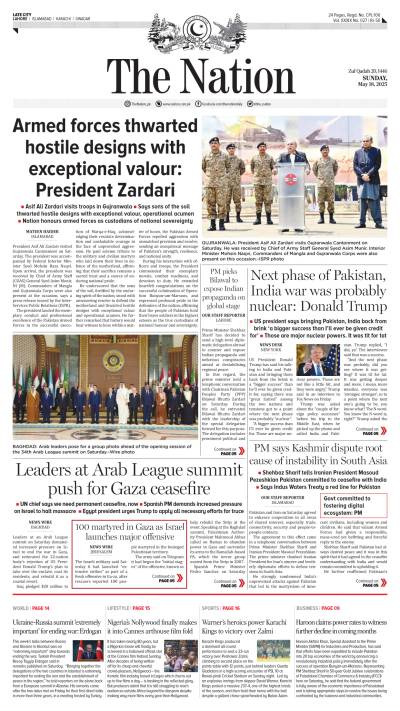Karachi - In a world overwhelmed by intractable and increasingly violent political conflicts, there is a need to question the logic of nationalism and the nation-state system. This may offer the best hope for a world beyond the current deadlock in politics globally.
This was the predominant themeof “Repairing Politics” on Tuesday evening, the second session in the week-long 4th Post-Colonial Higher Education Conference. The conference is the flagship intellectual event by Habib University, Pakistan’s premier liberal arts and sciences higher educational institution. The theme for this year’s conference, chaired by Habib University’s Professor Nauman Naqvi, is “Reparative Futures: Decolonial Thought in the Global Ruins”. The conference spans five broad themes including environment, politics, economy, religion and reparative ends.
The second session featured the celebrated professor of government, Dr Mahmood Mamdani, and renowned sociologist, Dr Nandita Sharma. The session was chaired by Habib University’s Professor Massimo Ramaioli, with Professor Nauman Naqvi as the discussant.
Mamdani, who is the Herbert Lehman Professor of Government and Professor of Anthropology and Middle Eastern, South Asian, and African Studies (MESAAS) at Columbia University, spoke about his recent book, ‘Neither Settler Nor Native: The Making and Unmaking of Permanent Minorities’.
Comparing the colonial conquests of Indians in the US and the domination and enslavement of Africans, he discussed the co-emergence of racism and nationalismin the development of modern nation-states, and how it destroyed relationships between the majority and minorities. To understand the current Israel and Palestine state conflict, he said that it was important to understand both the conquest and settlement of the United States, and subsequently Nazi Germany.
“Victims of the nation-state project in Germany and Europe, Zionists decided to set up a nation-state in Herrod’s Israel,” he said, adding that in establishing a Jewish state, they sought to turn the majority Palestinians into a minority. “In reality, the nakba never ended, it continues today.”
With Palestinians excluded from sovereignty and power in the Jewish state of Israel, Dr Mamdani said that as long as the state and the nation remain coupled, neither a one-state nor a two-state solution are the answer. “One state would be akin to direct racial domination, whereas a two-state solution would seek to create a protectorate and lead to indirect colonialism under Zionist rule.”
Dr Mamdani proposed looking at the South African transition from apartheid to glimpse the vision of a third alternative.
“It is this South African lesson that needs to be driven home to Israelis, as many as possible, that Jews do not need to have a Jewish state to have a home in Palestine,” he suggested. On the other hand, he said that the Palestinians need to provide a political home to all anti-zionists and non-zionist groups – including Jews and Palestinians – while developing a new political consciousness that decouples the nation and the state. Professor Nandita Sharma, who teaches at the Sociology Department at the University of Hawaii at Manoa, examined the relationship between migrants and the emergence of nationalism in the post-colonial world.
National sovereignty and nationalism, she said, internalised the logic and terms of colonialism even as it emerged as counter to it. In the post-colonial new world order, she said that the political legitimacy of imperial states ended and the hegemony of national self-determination took over, which preserved the colonial idea of ‘settler’ and ‘native’. In Burma, the Muslim Rohingya were categorised as “illegal Bengali migrants” and it was argued that expelling them from both the nation and its sovereign territory was necessary for the defense of national society, she said.
It was a similar case in India where the ruling Bharatiya Janata Party (BJP) – acting on Hindu nationalism which informed the criteria for belonging to the Indian nation – “separated national natives - comprising primarily of Hindus but also, for now, Buddhists, Jains and Sikhs who are distinguished from the followers of “foreign “religions including Muslims, Christians and Parsis. “Claiming to have liberated people, post-colonialism liberated capital instead,” she said, adding that national citizenship and immigration controls were in fact responses to crises in capitalism.
“More nationalism leads to more anti-immigration politics which leads to further cheapening of the labour of migrants, which leads to more competition which leads to more nationalism which leads to cheaper migrant labour ad infinitum.”
In terms of a solution, she suggested decolonisation and universal freedom of movement area crucial first step to dismantling colonial-origin borders both physical and of identity.





